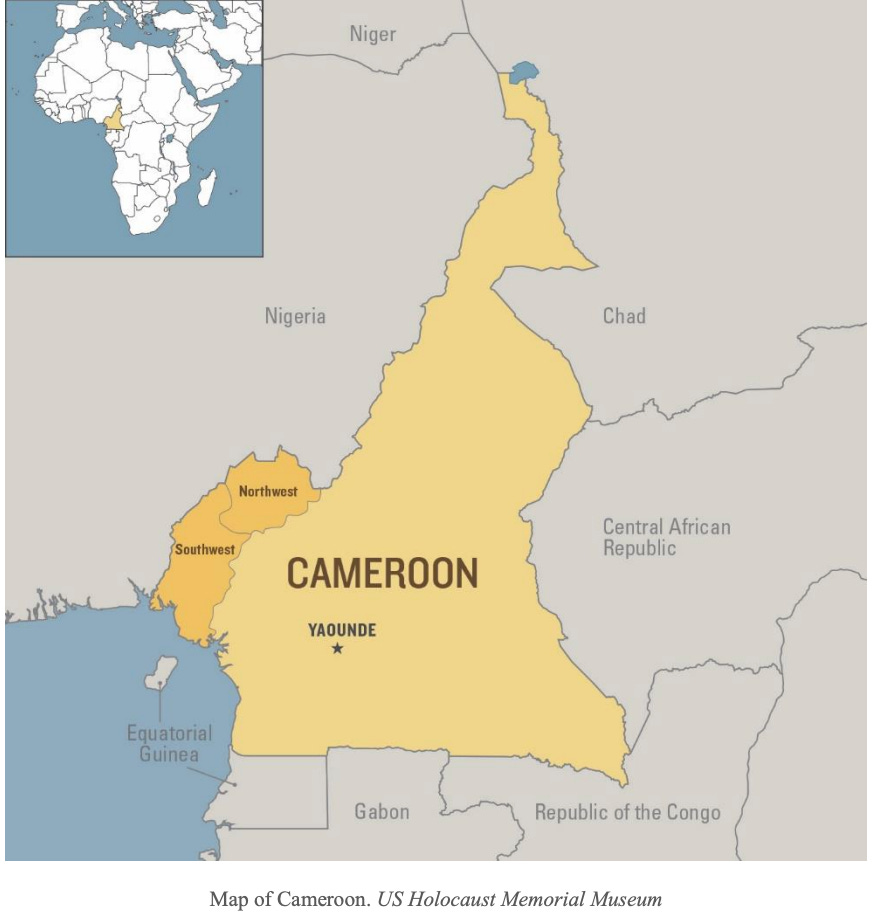Why the US Holocaust Museum’s Genocide Prevention Center is Concerned About Cameroon
A neglected crisis is getting worse. New research suggests a way out.
By Tallan Donine, Simon-Skjodt Center for the Prevention of Genocide
The crisis in Cameroon’s Anglophone North West and South West regions is deteriorating with few signs of abating.
The origins of the crisis are rooted in a history of colonization and long-standing grievances among Anglophone citizens in the predominantly Francophone country. In 2016, Anglophone teachers and lawyers launched protests over the imposition of French-speaking systems that they claimed marginalized Anglophone communities. By 2017, violent clashes between armed Anglophone separatists and state security forces began to spiral and the North West and South West regions were plunged into a deep humanitarian crisis and human rights catastrophe.
Five years on from its start, the conflict between Anglophone separatists and state security forces has killed over 6,000 people and displaced over 700,000. As of early 2023, more than half of schools in the Anglophone regions remain closed, and nearly five million people are in need of aid across the country. Both sides have faced accusations of committing severe human rights violations and atrocities, including unlawful killings, abductions, and torture.
Despite deliberate targeting of civilians and the reverberating effects upon lives across the country, international policymakers and multilateral organizations have largely overlooked the crisis in Cameroon — by some measures it is the most neglected crisis in the world.
Thus far, fitful international responses have failed to prevent atrocities and protect civilians. But there is a way out of this crisis. New research we did at the United States Holocaust Memorial Museum’s Simon-Skjodt Center for the Prevention of Genocide has identified several options to end this conflict peacefully and avoid future mass atrocities.
Why Past Attempts to peacefully end the Crisis in Cameroon have Failed
Multilateral organizations—including the United Nations, African Union, and European Union—and foreign governments have made official visits and issued statements of concern and condemnation of abuses over the past few years to little effect. Multilateral responses have all but stagnated. China, Russia, France, and other members of the UN Security Council have blocked the crisis from even being put on its agenda.
The most direct attempt at ending the conflict has come through mediation efforts led by Switzerland. But in September 2022, the Cameroonian government ended the talks. Experts contend that Cameroon’s President Paul Biya remains intent on a military victory.
Signaling some promise in January 2023, parties had reportedly agreed to take part in a peace process led by the Canadian government. President Biya has since denied agreeing to these talks, leaving their status unclear.
A New Approach to Prevent Mass Atrocities in Cameroon
The people of Cameroon deserve protection. Our research suggests several ways forward. This starts with identifying ways to strengthen international support and coordination for independent mediation processes and to involve actors with leverage over the conflict parties, such as African Union officials. Considering President Biya’s apparent hesitancy to accept mediation by third parties to date and few incentives among conflict parties to reach an agreement, coordinated support for a third-party-led mediation could help generate momentum to bring both sides to the table.
Expanding multilateral actor involvement—with groups such as other African governments and local mediation efforts such as those pursued by the Coalition for Dialogue and Negotiation—could also help press Biya to take a more serious role in the conversations. Governments with strong political and economic ties to Cameroon, such as the United States and France, could also exert leverage on Biya to halt abuses and work towards ending the crisis.
Mediation alone will likely not end the atrocities, but strategically coordinated policies could increase its potential for effectiveness. This includes leveraging multilateral diplomacy, such as by adding Cameroon to the agenda of the African Union Peace and Security Council and demonstrating sustained attention from the UN Special Adviser on the Prevention of Genocide, including a potential visit to Cameroon.
Another potential action that can be taken at the United Nations is to support fact-finding efforts, such as by launching an independent and systematic investigation into abuses committed by all parties and appointing a UN Special Envoy for Cameroon or a Special Rapporteur for Human Rights in Cameroon to investigate mass atrocities and advance justice and accountability.
There is also an opportunity to promote local civil society organizations working to prevent atrocities and protect civilians in Cameroon, such as through financial assistance and protection when appropriate, considering serious threats to their work.
These represent just a sample of the options to prevent atrocities and protect civilians in Cameroon, which our report fleshes out in full. Foreign governments and multilateral organizations have an overdue opportunity to respond. The suffering of people across the Anglophone region cannot be allowed to persist.
Editor’s note: Global Dispatches features research and analysis from the human rights, humanitarian, development and global affairs community. Have something you’d like to share with 9,300 subscribers to this newsletter? Contact me — Mark Leon Goldberg, Editor-in-Chief



